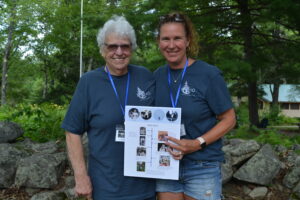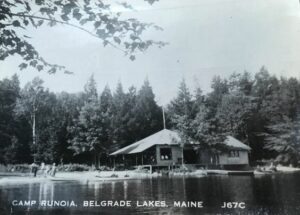As we round the corner into what feels like the back half of fall, many families are, possibly for the first time, searching for and hoping to choose a camp for their kid(s). Choosing a camp requires placing a lot of trust into camp professionals to care for your child and to provide a dream experience – but that trust doesn’t need to be blind. At Runoia, it is our goal to help campers find their best fit camp. We are always thrilled when that happens to be Runoia, but each camp is entirely unique from the next. It’s important to know what’s important to you (and your child,) ask the right questions, and pursue that experience. After countless parent phone calls and Zooms, here are the top things we suggest parents and guardians think about when choosing a camp, and some helpful questions to ask a camp director when looking:
Laser-focused or well-rounded?
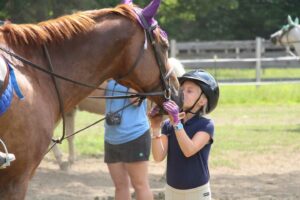
The label ‘camp’ can mean anything from a soccer day camp to a sleep-away camp with dozens of activities. Are you hoping that your child focuses on building one particular skill – sailing, riding, a team sport, etc. – or do you hope that they will broaden their horizons, try new things, and gain skills in multiple activities in one summer?
Runoia falls into the latter category – with 30+ activity choices and exceptional programs in multiple areas like our complete waterfront, on-campus riding program, trips, and more! Here are some questions you can ask a camp director:
- How many activities do you offer at camp?
- What would you say are your biggest programs?
- How do you offer skill progression in different activities?
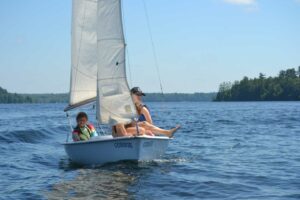 Pre-planned or elective?
Pre-planned or elective?
This is an important question to ask, especially after deciding on the prior! Once you know how many and what kind of activities a camp offers, it’s important to also know how much of a camper’s schedule is in their own control. If you are leaning towards a camp that specializes in just a handful of activities, you may also be looking for a structured camp that sets campers’ schedules for them. Runoia’s culture is one of choice and individual expression – our campers choose their own schedules in 2-day and 3-day blocks at camp. Our campers choose their schedules at camp for each block at a time, so they can pursue a new-found passion, change their minds, or be a completely different person from one block to the next! Here are some great questions to ask a camp director to get a sense of their structure:
- Do campers have full, partial, or no control over their schedule and activity choices?
- Do campers do activities with their cabin group or are classes mixed?
- Do campers choose their schedules before arriving or at camp?
- Do you offer any special-focus programs for campers to enroll in?
Small community or big population?
There are certainly benefits to each different camp population size, from a trip program with just a handful of staff and campers, to communities with hundreds of staff members and thousands of campers in one summer! When choosing a camp, ask yourself and your child whether they would prefer a tight-knit community – one where everyone knows one another and friendships span all ages – or a large community with the opportunity to meet hundreds of others? Runoia is a community like the former; our director team knows our campers’ names and each are involved in all aspects of the community on a day-to-day basis. Here are some questions to ask a director about their community:
- What is your community size in each session?
- How many campers and staff are in each cabin?
- What is your overall staff to camper ratio?
- Are your senior-level staff and directors involved in the daily community?
Community, Care, Culture, and Connection
It can be a challenge to earnestly understand the culture and sense of community at a camp just from looking at a website or social media. While we hope that our values shine through even virtually, this is one of the top reasons for having a conversation with a director. Hearing the belief of the value of camp and its impact on campers shine through a director’s voice on the phone can truly make the difference. Runoia’s culture is one that is kind and inclusive and intentionally built through our alumni all the way down to our youngest campers. Here are some questions to ask to get a good sense of the community, care for children, culture, and sense of connection at a potential camp:
- How would you describe the ‘typical camper’ at your camp – what kids do well, and what does a successful summer look like for your typical camper?
- How do you build community year-round and integrate new campers into your standing community?
- Do you have an involved community of alumni?
- How would you describe the culture of your camp? Is it competitive? Is it kind, inclusive, and welcoming?
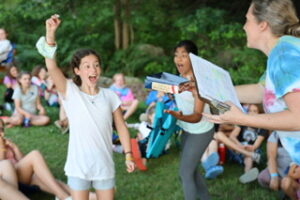
Tradition
As a camp entering its 117th consecutive season, we’re no stranger to tradition – when your camp has been standing since 1907, you pick up a few along the way! We try to strike our best balance between tradition and progression – honoring our foundations while moving forward. Here are some great questions to ask on tradition:
- What traditions are important to your camp?
- Does your camp partake in any intra or inter-camp competitions?
- Do you have something like ‘color wars’?
- Do you ever reevaluate traditions with a DEI lens?
An immersed experience, or connection to the ‘real world?’
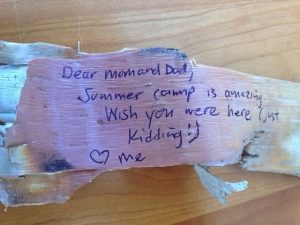
We believe that camp poses a unique opportunity to ‘unplug’ to connect to nature, others, and ourselves. Therefore, Runoia offers a truly classic, immersed camp experience for its campers and staff. Technology is a no-go at Runoia, and we keep it old-school with letter-writing. Runoia also communicates with parents throughout the week through multiple modalities. We find that our system of communication really helps our campers make the most of their time at camp, connect to others, and fight off feelings of homesickness. Each camp is different, however, and it’s important to know what level of communication you expect from your ideal camp. Ask these questions:
- Are phone calls allowed at camp?
- Can you describe how mail works at your camp?
- Do you have a system of regular communication for updates from the leadership team?
Session length
Again, each camp is so different from the next, and the topic of session length is no exception! Camps range from offering just 1-week sessions throughout the summer, to only offering a summer-long experience. Runoia offers two 3-week sessions and limited opportunities for a full summer. We also offer a 2-week ‘try it’ program for our youngest campers called Harmony Land Camp. When thinking about session length, try asking these questions:
- Do you offer a shorter ‘starter camp’ program to try? What ages are eligible if so?
- What are your session dates and how long is each session?
- Do most campers choose to go for one session or the full summer?
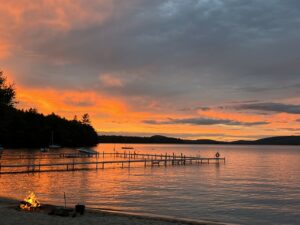
Location, location, location
We might be a touch biased to say that Maine really is the summer camp capitol of the world, and Maine does it well! Offering plenty of water, beautiful green land, and mountains to boot – you just can’t beat it. And since each year we welcome campers who have traveled from not just states away but countries away, we’d have to say it’s a worthwhile journey.
Here are some important questions to ask about location and transportation:
- What are the options for transportation to camp?
- What does opening day look like for each mode of transportation?
- Do parents and guardians tend to travel in the area for the duration of camp?
Diversity
To choose a camp, it is important that your child finds a community in which they can see themselves represented by other campers, staff, and in camp policies. Runoia is happy to have seen its camper diversity grow organically in recent years, and has responded with the formation of its DAC, Diversity Advisory Committee, and intentional efforts to positively impact access to camp and the experience of camp for all families. Whether this directly impacts your camper or not, it is an important component in a camp’s culture and community. Here are some questions to ask a director on diversity at camp:
- How would you describe the diversity of your camp? Has it grown recently?
- Does your camp have any official advisory, DEI professional, or DEI policy in place?
- Do you offer DEI training to your staff members?
- How does your camp approach gender identity and pronoun expression?
What does it mean to be accredited?
To help reduce risk, Camp Runoia is voluntarily accredited by the American Camp Association (ACA). We follow standards pertaining to: program, site, facilities, transportation, vehicles, administration, personnel, and health care. If a camp holds a current ACA accreditation, it means that it has also been evaluated to meet the same rigorous set of standards as Runoia. Here are a few questions to ask about accreditation:
- Is your camp currently accredited by the ACA?
- Has there ever been a time recently when your camp was not accredited?
There are many factors to consider when looking to choose a camp, and each individual family and camper will have a unique set of ideas of what ‘camp’ should look and feel like to them. We hope you utilize these helpful questions in your next conversation with a camp director and wish you luck on your camp search!
Interested in Runoia? Reach out to request more information!
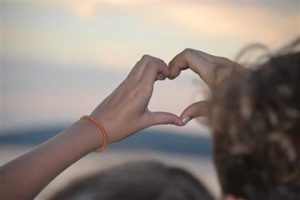
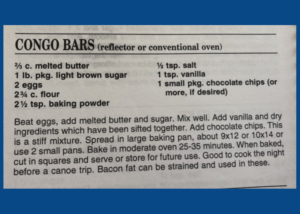
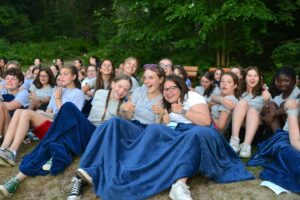
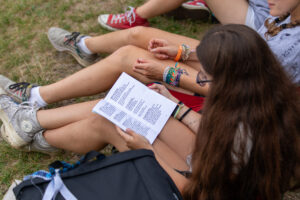

 Pre-planned or elective?
Pre-planned or elective?


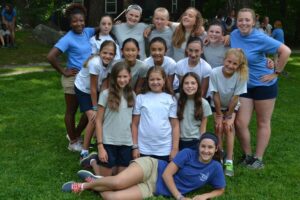
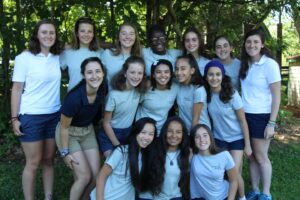
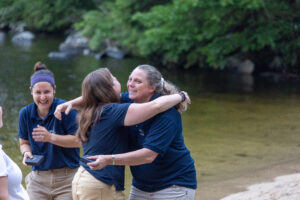

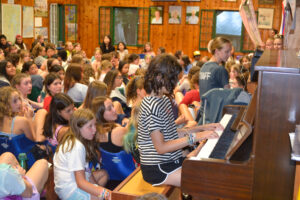
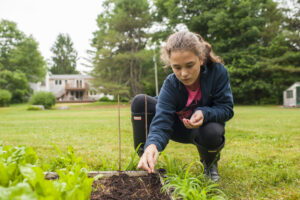
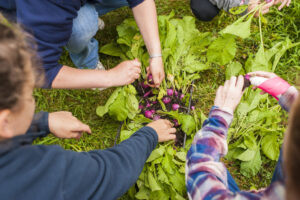






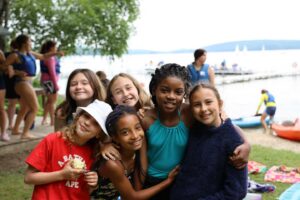 As we round the corner into what feels like the back half of fall, many families are, possibly for the first time, searching for and choosing a brand new camp for their kid(s). Choosing a camp requires placing a lot of trust into camp professionals to care for your child and to provide a dream experience – but that trust doesn’t need to be blind. At Runoia, it is our goal to help campers find their best fit camp. We are always thrilled when that happens to be Runoia, but each camp is entirely unique from the next. It’s important to know what’s important to you (and your child,) ask the right questions, and pursue that experience. After countless parent phone calls and Zooms, here are the top things we suggest parents and guardians think about when choosing a camp, and some helpful questions to ask a camp director when looking:
As we round the corner into what feels like the back half of fall, many families are, possibly for the first time, searching for and choosing a brand new camp for their kid(s). Choosing a camp requires placing a lot of trust into camp professionals to care for your child and to provide a dream experience – but that trust doesn’t need to be blind. At Runoia, it is our goal to help campers find their best fit camp. We are always thrilled when that happens to be Runoia, but each camp is entirely unique from the next. It’s important to know what’s important to you (and your child,) ask the right questions, and pursue that experience. After countless parent phone calls and Zooms, here are the top things we suggest parents and guardians think about when choosing a camp, and some helpful questions to ask a camp director when looking: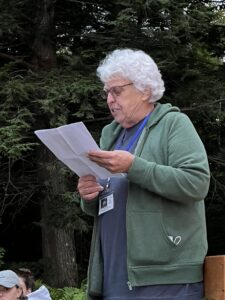
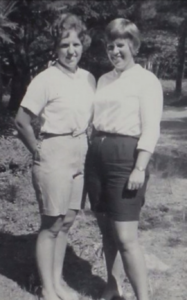 I attended Camp Runoia for ten summers as both a camper and a counselor, and those years were formative for me.
I attended Camp Runoia for ten summers as both a camper and a counselor, and those years were formative for me.